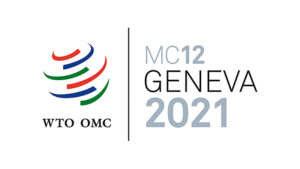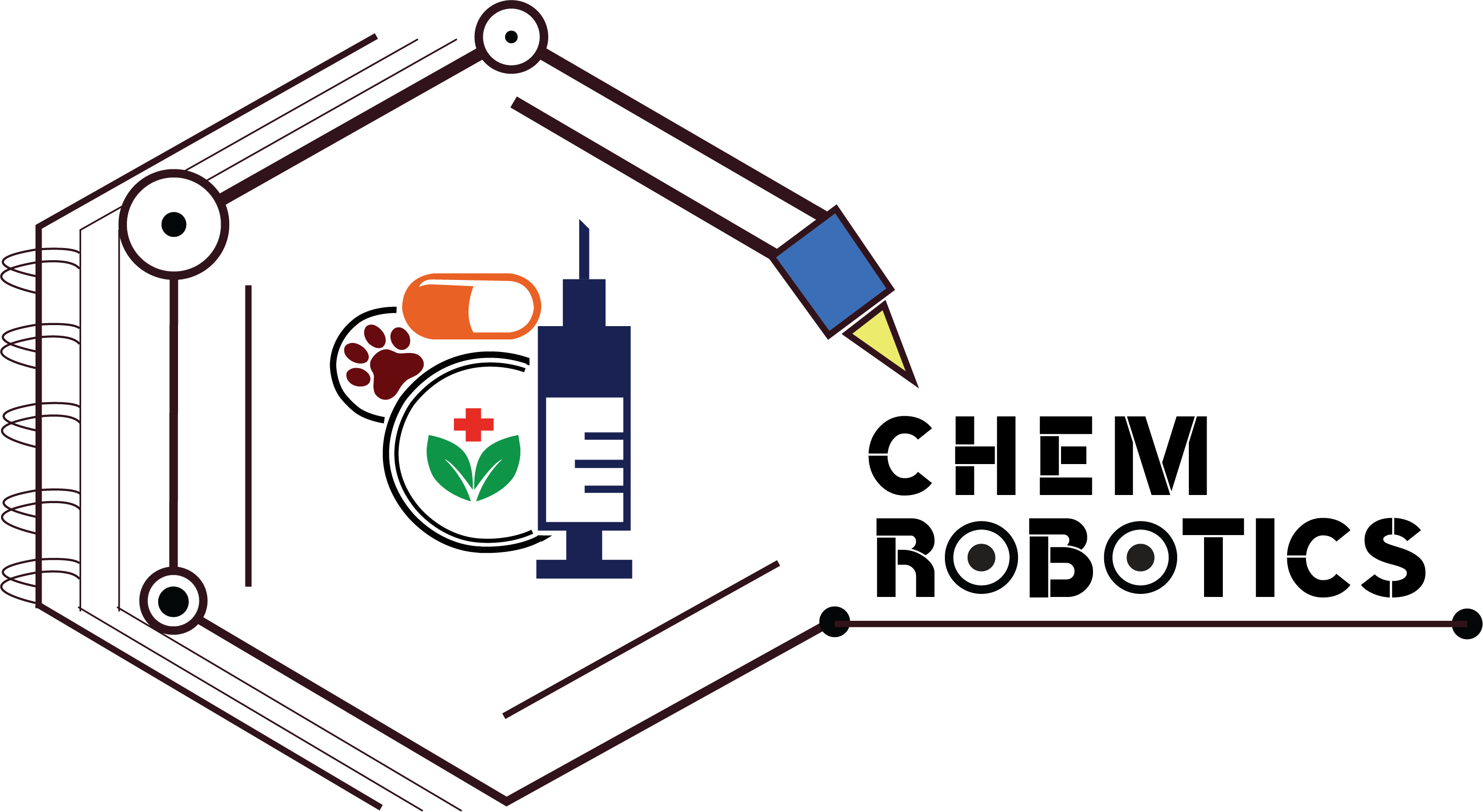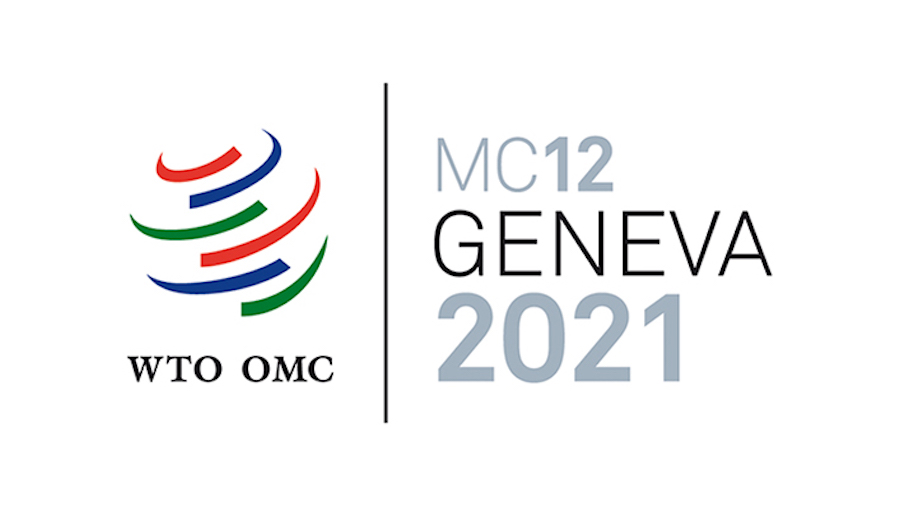Abstract:
The upcoming 12th Ministerial Conference that is to be held in Geneva, Switzerland from November 30 to December 3. WTO’s response to the COVID-19 pandemic will be an important area of discussion at the 12th WTO Ministerial Conference to be held later this month which will also evaluate the WTO’s preparedness for other such pandemics in the future. This was discussed at the second webinar of the “Reforming WTO for the 21st Century” series organized by ICRIER on Monday.

The Twelfth WTO Ministerial Conference is to be held in Geneva, from November 30 to December 3
Introduction:
The 12th Ministerial Conference (MC12) will take place from 30 November to 3 December 2021 in Geneva, Switzerland. Ministers from across the world will have the opportunity to review the functioning of the multilateral trading system, to deliver prepared statements and to take action on the future work of the WTO. The Conference will be co-hosted by Kazakhstan and chaired by the Minister of Trade and Integration of Kazakhstan, Bakhyt Sultanov. Kazakhstan was originally scheduled to host MC12 in June 2020 but the conference was postponed due to the COVID-19 pandemic.
Background
MC12 was originally scheduled to take place in June 2020 in Nur-Sultan, Kazakhstan, but was postponed due to the COVID-19 pandemic. In May 2020, WTO members discussed Kazakhstan’s offer to reschedule the conference to June 2021 but postponed taking a decision. In April 2021, members agreed that MC12 would take place in Geneva from 30 November to 3 December. This will be the fourth time that the Ministerial Conference will be hosted by Geneva, where the headquarters of the WTO are located. Previous meetings took place in Geneva in 1998, 2009 and 2011.
Ministerial conferences
The Ministerial Conference, which is attended by trade ministers and other senior officials from the organization’s 164 members, is the highest decision-making body of the WTO. Under the Marrakesh Agreement Establishing the WTO, the Ministerial Conference is to meet at least once every two years.
About World Trade Organization:
The World Trade Organization (WTO) is an intergovernmental organization that regulates and facilitates international trade between nations. Governments use the organization to establish, revise, and enforce the rules that govern international trade. It officially commenced operations on 1 January 1995, pursuant to the 1994 Marrakesh Agreement, thus replacing the General Agreement on Tariffs and Trade (GATT) that had been established in 1948. The WTO is the world’s largest international economic organization, with 164 member states representing over 98% of global trade and global GDP.
The WTO facilitates trade in goods, services and intellectual property among participating countries by providing a framework for negotiating trade agreements, which usually aim to reduce or eliminate tariffs, quotas, and other restrictions; these agreements are signed by representatives of member governments: fol.9–10 and ratified by their legislatures. The WTO also administers independent dispute resolution for enforcing participants’ adherence to trade agreements and resolving trade-related disputes. The organization prohibits discrimination between trading partners, but provides exceptions for environmental protection, national security, and other important goals.
The WTO is headquartered in Geneva, Switzerland. Its top decision making body is the Ministerial Conference, which is composed of all member states and usually convenes biennially; consensus is emphasized in all decisions. Day-to-day functions are handled by the General Council, made up of representatives from all members. A Secretariat of over 600 personnel, led by the Director-General and four deputies, provides administrative, professional, and technical services. The WTO’s annual budget is roughly 220 million USD, which is contributed by members based on their proportion of international trade.
Studies show the WTO has boosted trade and reduced trade barriers. It has also influenced trade agreement generally; a 2017 analysis found that the vast majority of preferential trade agreements (PTAs) up to that point explicitly reference the WTO, with substantial portions of text copied from WTO agreements. Goal 10 of the United Nations Sustainable Development Goals also referenced WTO agreements as instruments of reducing inequality. However, critics contend that the benefits of WTO-facilitated free trade are not shared equally, citing the outcomes of negotiations and data showing a continually widening gap between rich and poor nations.
Ministerial conferences
First ministerial conference
The inaugural ministerial conference was held in Singapore in 1996. Its primary purpose was to initiate an international effort among global trading nations to overhaul the structure and mechanisms of the General Agreement on Tariffs and Trade (GATT) while preserving the considerable progress and success achieved by that system since its inception in 1948.
Disagreements, largely between developed and developing economies, emerged over four issues initiated by this conference; afterward, these were collectively referred to as the “Singapore issues”.
Second ministerial conference
Was held in Geneva in Switzerland.
Third ministerial conference
The third conference in Seattle, United States ended in failure, with massive demonstrations and police and National Guard crowd control efforts drawing worldwide attention.
Fourth ministerial conference
The fourth conference was held in Doha In Persian Gulf nation of Qatar. The Doha Development Round was launched at the conference. The conference also approved the joining of China, which became the 143rd member to join.
Fifth ministerial conference
The ministerial conference was held in Cancún, Mexico, aiming at forging agreement on the Doha round. An alliance of 22 southern states, the G20 (led by India, China and Brazil), resisted demands from the North for agreements on the so-called “Singapore issues” and called for an end to agricultural subsidies within the EU and the US. The talks broke down without progress.
Sixth ministerial conference
The sixth WTO Conference Ministerial was held in Hong Kong from 13 December – 18 December 2005. It was considered vital if the four-year-old Doha Development Agenda negotiations were to move forward sufficiently to conclude the round in 2006. In this meeting, countries agreed to phase out all their agricultural export subsidies by the end of 2013, and terminate any cotton export subsidies by the end of 2006. Further concessions to developing countries included an agreement to introduce duty-free, tariff-free access for goods from the Least Developed Countries, following the Everything But Arms initiative of the European Union — but with up to 3% of tariff lines exempted.
Seventh ministerial conference
Was held 30 November – 2 December 2009 in Geneva, Switzerland. The general theme for discussion was “The WTO, the Multilateral Trading System and the Current Global Economic Environment”.
Eighth ministerial conference
Was held 15–17 December 2011 in Geneva, Switzerland. Membership agreement were made for Russia, Samoa, and Montenegro.
Ninth ministerial conference
Was held 3–6 December 2013 in Bali, Indonesia. 159 members of World Trade Organization agreed to the Bali Package which eases barriers to international trade.
Tenth ministerial conference
The WTO’s 10th Ministerial Conference was held in Nairobi, Kenya, from 15 to 19 December 2015. The completion of Afghanistan and Liberia’s accession to the WTO was on the agenda. It culminated in the adoption of the “Nairobi Package”, a series of six Ministerial Decisions on agriculture, cotton and issues related to least-developed countries (LDCs). The Conference was chaired by Kenya’s Cabinet Secretary for Foreign Affairs and International Trade, Amina Mohamed.
Eleventh ministerial conference
Main article: World Trade Organization Ministerial Conference of 2017
The WTO’s 11th Ministerial Conference was held in Buenos Aires, Argentina, from 11 to 13 December 2017. It was chaired by Minister Susana Malcorra of Argentina. The Conference ended with a number of ministerial decisions, including on fisheries subsidies and e-commerce duties, and a commitment to continue negotiations in all areas.
Twelfth ministerial conference
The agreement to host the 12th WTO Ministerial Conference in Nur-Sultan, Kazakhstan was signed on October 30, 2019. The Ministerial Conference was scheduled for June 8-11, 2020, but was postponed and will take place on November 29, 2021 in Geneva, Switzerland, due to the COVID-19 pandemic.
Objectives and operation:
The WTO has six key objectives:
(1) To set and enforce rules for international trade
(2) To provide a forum for negotiating and monitoring further trade liberalization
(3) To resolve trade disputes
(4) To increase the transparency of decision-making processes
(5) To cooperate with other major international economic institutions involved in global economic management, and
(6) To help developing countries benefit fully from the global trading system. Although shared by the GATT, in practice these goals have been pursued more comprehensively by the WTO.
Functions of World Trade Organization:
Among the various functions of the WTO, these are regarded by analysts as the most important:
- It oversees the implementation, administration and operation of the covered agreements (with the exception is that it does not enforce any agreements when China came into the WTO in Dec 2001)
- It provides a forum for negotiations and for settling disputes.
Additionally, it is WTO’s duty to review and propagate the national trade policies and to ensure the coherence and transparency of trade policies through surveillance in global economic policy-making. Another priority of the WTO is the assistance of developing, least-developed and low-income countries in transition to adjust to WTO rules and disciplines through technical cooperation and training.
- The WTO shall facilitate the implementation, administration, and operation and further the objectives of this Agreement and the Multilateral Trade Agreements, and shall also provide the framework for the implementation, administration, and operation of the multilateral Trade Agreements.
- The WTO shall provide the forum for negotiations among its members concerning their multilateral trade relations in matters dealt with under the Agreement in the Annexes to this Agreement.
- The WTO shall administer the Understanding on Rules and Procedures Governing the Settlement of Disputes.
- The WTO shall administer a Trade Policy Review Mechanism.
- To achieve greater coherence in global economic policymaking, the WTO shall cooperate, as appropriate, with the International Monetary Fund (IMF) and with the International Bank for Reconstruction and Development (IBRD) and its affiliated agencies.
The above five listings are the additional functions of the World Trade Organization. As globalization proceeds in today’s society, the necessity of an International Organization to manage the trading systems has been of vital importance. As the trade volume increases, issues such as protectionism, trade barriers, subsidies, violation of intellectual property arise due to the differences in the trading rules of every nation. The World Trade Organization serves as the mediator between the nations when such problems arise. WTO could be referred to as the product of globalization and also as one of the most important organizations in today’s globalized society.
The WTO is also a center of economic research and analysis: regular assessments of the global trade picture in its annual publications and research reports on specific topics are produced by the organization. Finally, the WTO cooperates closely with the two other components of the Bretton Woods system, the IMF and the World Bank.
Principles of the trading system:
The WTO establishes a framework for trade policies; it does not define or specify outcomes. That is, it is concerned with setting the rules of “trade policy.” Five principles are of particular importance in understanding both the pre-1994 GATT and the WTO:
- Non-discrimination. It has two major components: the most favoured nation(MFN) rule and the national treatment Both are embedded in the main WTO rules on goods, services, and intellectual property, but their precise scope and nature differ across these areas. The MFN rule requires that a WTO member must apply the same conditions on all trade with other WTO members, i.e., a WTO member has to grant the most favourable conditions under which it allows trade in a certain product type to all other WTO members. “Grant someone a special favour and you have to do the same for all other WTO members.” National treatment means that imported goods should be treated no less favourably than domestically produced goods (at least after the foreign goods have entered the market) and was introduced to tackle non-tariff barriers to trade (e.g. technical standards, security standards et al. discriminating against imported goods).
- Reciprocity. It reflects both a desire to limit the scope of free-ridingthat may arise because of the MFN rule and a desire to obtain better access to foreign markets. A related point is that for a nation to negotiate, it is necessary that the gain from doing so be greater than the gain available from unilateral liberalization; reciprocal concessions intend to ensure that such gains will materialize.
- Binding and enforceable commitments. The tariff commitments made by WTO members in multilateral trade negotiation and on accession are enumerated in a schedule (list) of concessions. These schedules establish “ceiling bindings”: a country can change its bindings, but only after negotiating with its trading partners, which could mean compensating them for loss of trade. If satisfaction is not obtained, the complaining country may invoke the WTO dispute settlement procedures.
- Transparency. The WTO members are required to publish their trade regulations, to maintain institutions allowing for the review of administrative decisions affecting trade, to respond to requests for information by other members, and to notify changes in trade policies to the WTO. These internal transparency requirements are supplemented and facilitated by periodic country-specific reports (trade policy reviews) through the Trade Policy Review Mechanism(TPRM). The WTO system tries also to improve predictability and stability, discouraging the use of quotas and other measures used to set limits on quantities of imports.
- Safety values. In specific circumstances, governments are able to restrict trade. The WTO’s agreements permit members to take measures to protect not only the environment but also public health, animal health and plant health.
There are three types of provision in this direction:
- articles allowing for the use of trade measures to attain non-economic objectives;
- Articles aimed at ensuring “fair competition”; members must not use environmental protection measures as a means of disguising protectionist policies.
- Provisions permitting intervention in trade for economic reasons.
Exceptions to the MFN principle also allow for preferential treatment of developing countries, regional free trade areas and customs unions.
Organizational structure:
The highest authority of the WTO is the Ministerial Conference, which must meet at least every two years.
In between each Ministerial Conference, the daily work is handled by three bodies whose membership is the same; they only differ by the terms of reference under which each body is constituted.
The General Council
The Dispute Settlement Body
The Trade Policy Review Body
The General Council, whose Chair as of 2020 is David Walker of New Zealand, has the following subsidiary bodies which oversee committees in different areas:
Council for Trade in Goods
There are 11 committees under the jurisdiction of the Goods Council each with a specific task. All members of the WTO participate in the committees. The Textiles Monitoring Body is separate from the other committees but still under the jurisdiction of the Goods Council. The body has its chairman and only 10 members. The body also has several groups relating to textiles.
Council for Trade-Related Aspects of Intellectual Property Rights
Information on intellectual property in the WTO, news and official records of the activities of the TRIPS Council, and details of the WTO’s work with other international organizations in the field.
Council for Trade in Services
The Council for Trade in Services operates under the guidance of the General Council and is responsible for overseeing the functioning of the General Agreement on Trade in Services (GATS). It is open to all WTO members and can create subsidiary bodies as required.
Trade Negotiations Committee
The Trade Negotiations Committee (TNC) is the committee that deals with the current trade talks round. The chair is WTO’s director-general. As of June 2012 the committee was tasked with the Doha Development Round.
The Service Council has three subsidiary bodies: financial services, domestic regulations, GATS rules, and specific commitments. The council has several different committees, working groups, and working parties. There are committees on the following: Trade and Environment; Trade and Development (Subcommittee on Least-Developed Countries); Regional Trade Agreements; Balance of Payments Restrictions; and Budget, Finance and Administration. There are working parties on the following: Accession. There are working groups on the following: Trade, debt and finance; and Trade and technology transfer.
As of 31 December 2019, the number of WTO staff on a regular budget is 338 women and 285 men.
SOURCE: https://www.wto.org/english/thewto_e/minist_e/mc12_e/mc12_e.htm
For more Information: Sign-in Websites for Agrochemical & Pharmaceutical Databases:
Website: https://www.chemrobotics.com/ (Agrochemical Databases)
Website: https://chemroboticspharma.com/ (Pharmaceutical Databases)


